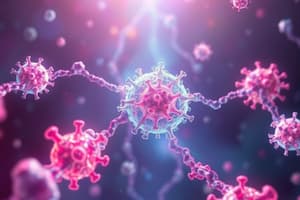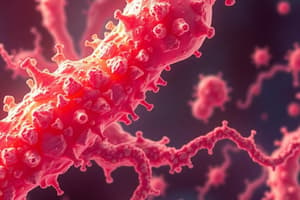Podcast
Questions and Answers
Explain the main characteristics of superantigens and their role in immune system activation.
Explain the main characteristics of superantigens and their role in immune system activation.
Superantigens are ~25 kDa toxins that are extremely potent immune system activators. They are highly soluble, have no enzymatic activity or conformational changes, and generally have little primary sequence homology but highly conserved structure. They can lead to high-level production of IL-2, IL-17A, and IFNγ from T cells, as well as other cytokines, triggering a cytokine storm which can develop into toxin shock syndrome.
What are the primary causes of staphylococcal toxic shock syndrome and streptococcal toxic shock syndrome?
What are the primary causes of staphylococcal toxic shock syndrome and streptococcal toxic shock syndrome?
The primary cause of staphylococcal toxic shock syndrome is TSST-1 (menstrual form) and TSST-1, SEB, or SEC (nonmenstrual forms), while streptococcal toxic shock syndrome is primarily caused by SpeA and SpeC, occurring in association with severe invasive disease.
Describe the symptoms of staphylococcal toxic shock syndrome and streptococcal toxic shock syndrome.
Describe the symptoms of staphylococcal toxic shock syndrome and streptococcal toxic shock syndrome.
Staphylococcal TSS symptoms include fever, hypotension, rash, and desquamation caused by toxic shock syndrome toxin-1 (TSST-1) and staphylococcal enterotoxins (SEs). Streptococcal TSS symptoms include fever, hypotension, rash (not always), and desquamation (not always), commonly associated with invasive disease caused by streptococcal pyrogenic exotoxins (SPEs).
Differentiate between conventional T cell activation and T cell superantigen-mediated activation.
Differentiate between conventional T cell activation and T cell superantigen-mediated activation.
What cytokines are produced at high levels during superantigen-induced immune system activation, and how can this lead to toxic shock syndrome?
What cytokines are produced at high levels during superantigen-induced immune system activation, and how can this lead to toxic shock syndrome?
Flashcards are hidden until you start studying




